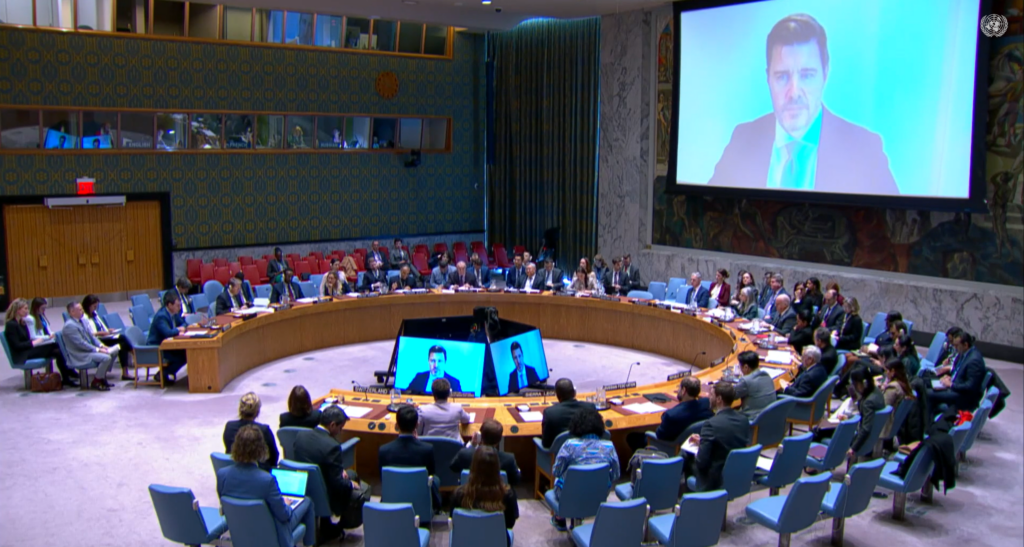Mr. President, thank you for the opportunity to address the council and for your attention to this topic.
As a brief introduction, the International NGO Safety Organisation, or INSO, is an independent non-profit serving as the safety and security coordinating body for the NGO community. We support over 1400 local and international NGO in 22 of the highest risk contexts and work closely with the UNSMS through the Saving Lives Together initiative.
We have three objectives today, first to update you on the current trends affecting humanitarian safety, second to brief you on some of the progress that has been made, and finally to make our recommendations for the next steps.
Mr. President – Seen through the eyes of a humanitarian, the world is a volatile and dangerous place.
On a daily basis we navigate national and international armed conflicts that are conducted without respect for IHL and with a blatant disregard for the lives of the civilians caught up in them.
The proliferation of armed actors can leave us negotiating access on a village-by-village basis, while States and Governments increasingly view aid as a partisan act to be directed, controlled, and criminalized.
On average, at least one aid worker is killed, injured, or abducted every single day. Among other causes, in 2024 they have lost their lives to airstrikes in Palestine, IEDs in Somalia, ambushes in DR Congo, and inter-communal violence in South Sudan. These deaths are rarely investigated, and their perpetrators are never held accountable.
National and locally recruited personnel are particularly vulnerable, accounting for over 90% of victims, and yet the international recognition and response to their death is often lacking.
At 30% of incidents, and for the second year in a row, Government forces posed more of a threat to humanitarians than non-state armed groups, with
the leading cause of death being explosive weapons in urban environments, most notably in Gaza, Ukraine and Sudan.
Violence at the hands of Non-State Armed Groups remained prevalent at 20% but has diminished significantly with the winding up of conflict in Syria, Iraq and Afghanistan with the most common incidents now occurring in across Africa.
Crime is endemic in conflict zones and remains a key driver of insecurity, accounting for 40% of all incidents in 2024, while the criminalization of aid itself has emerged as a major challenge with over 400 aid workers arrested while delivering assistance and an explosive growth in NGO bans and restrictions.
These are frequently combined with disinformation campaigns against the fundamental legitimacy of aid and have led in some cases to the suspension of life-saving medical assistance, the removal of senior humanitarian leaders, and the closure of common services.
Mr. President – while the situation is undoubtedly challenging, we cannot overlook the many positive initiatives that have emerged at all levels.
At the operational level, the highest risk countries are now covered by a network of field safety platforms providing round-the-clock support that is equally accessible to national and international NGOs.
The community has access to an unprecedented volume of data and a wide range of training opportunities in everything from first aid to access negotiations.
The various international Councils and Forums have helped cooperation between NGOs become routine while cooperation between NGOs and the UN under Saving Lives Together is improving, and I would like thank USG Michaud for his commitment to that initiative.
More recently, new projects have emerged offering financial, legal and psychosocial support to victims of violence and filling an important gap in accountability and duty of care.
At the policy level, humanitarian safety has also taken centre stage, from the EU Call to Action in 2021, the Ministerial Group action to protect aid workers
convened by the Australian Foreign Minister last year, and now the welcome introduction of Resolution 2730.
Taken together, these developments represent a robust and comprehensive response and highlight the importance of operational agencies taking the lead in devising solutions to their own problems.
While recognizing that many of the risks facing humanitarians fall outside the power of the Council to address, there remain several areas where it can take meaningful action.
First, the Council could encourage donor States to also Stay and Deliver, especially during times of crisis and transition. The voluntary withdrawal of in-country representation, as occurred in Afghanistan, leaves NGOs vulnerable and makes it harder to develop the common operating picture that is so vital.
Other options could include the deployment of Special Humanitarian Envoys or the encouragement of multi-State initiatives to facilitate continued diplomatic engagement on humanitarian issues during times of acute crisis.
Second, much more can be done to protect humanitarian space and challenge the worrying trend of criminalization of aid.
At the core of this issue is the principle of impartial contact with all parties to a conflict and the Council must ensure organisations can accomplish this without fear of harassment, sanction or punishment.
This includes supporting the mandate of UNOCHA to open and maintain humanitarian space and ensuring a strong collective response when they are victimized for doing so.
It also includes ensuring that the carve outs of 2664 are replicated in both domestic and international legislation to further protect independent, impartial and neutral humanitarian action.
Third and finally, we suggest that the protection of aid workers is always approached through the more inclusive lens of the Protection of Civilians.
While we welcome the attention, the fact is that violence against aid workers is more commonly linked in their identity as civilians than as aid workers and by isolating us there is a risk that wider impacts are neglected.
Where we see gross violations of International Humanitarian Law, the Council must act decisively and address the double standard of member states who continue to support those responsible for civilian and aid worker deaths.
-END-
If you prefer to watch, you can view our address here:

